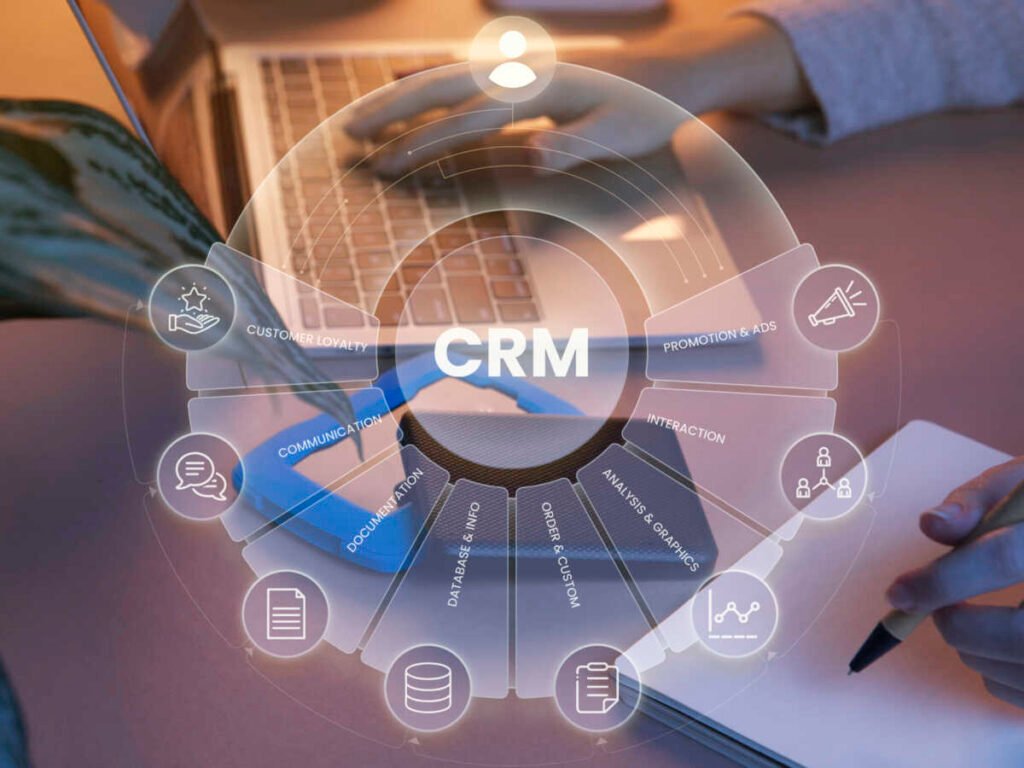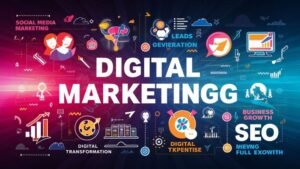With the increasing competition in the business world, customer-centered models have become a necessity in any digital marketing business model. Companies have also started to turn to a digital marketing agency in Bangalore to assist in the adoption and application of Customer Relationship Management (CRM) tools while marketing activities for better management of customers. Nevertheless, what role does CRM play in the context of digital marketing for business management? What is the value of CRM systems to the organization? We will focus on the dynamics of developing an effective CRM system and how this tool will help you run efficient digital marketing strategies.
What is the use of CRM in digital marketing?

One of the operative definitions based on the vast usage and understanding of the key elements and relativity of the Internet as MR CRM objectively defines is the convergence of the organization’s functional and performance as well as relationships with customers within a digital-based environment. Under such a definition, CRM tools as commonplace and taken for granted in today’s business have become exceedingly important in the practice of modern digital marketing. CRM in this context internet is a systematic approach towards the management and evaluation of customer relationships and incorporates Intelligence inside the usage of e-business.
In the field of digital marketing, CRMs can be utilized to record as well as assess leads, categorize customer databases, target communications, and assess the performance of marketing activities. Thanks to the CRM implementation, email marketing, social networks, and websites can be combined to improve the user’s experience when searching for valuable information. Generally, CRM serves as the foundation for marketing models that revolve around customers, ensuring that timely and pertinent information is dispatched to the targeted audience.
What are the benefits of using CRM?

To begin with, there are several advantages to employing a CRM software application in digital marketing. Here are some key benefits:
- Better Understanding of Your Customers: Indeed, the most important advantage of a CRM software tool is its ability to analyze and measure levels of customers. It can gather information from different sources be it social media activities, emails, or any other means, and arrange the data collected logically. This information can be useful to marketers since they can formulate targeted marketing tools for each specific customer behavior which will contribute to better conversion.
- Improved Audience Targeting: CRM permits the organization and targeting of market segments based on some characteristics such as age and occupation, buying patterns, or level of interaction. Such segmentation helps marketers to focus on categories of clients who can, in turn, receive appropriate content, offers, or promotions, for them to assist in the delivery of the right information to the right clients at the right time.
- Improved Efficiency and Productivity: The application of word processors within CRM tasks, for example, can help businesses a lot in terms of saving time. There is less manual work with the systems since campaigns can be organized, customer activities can be logged, and the results data can be assessed using CRM systems. This means those who are on the marketing teams are more likely to engage in strategic marketing rather than operational, thus enhancing productivity.
- Improved Customer Detention and Loyalty: With the use of CRM tools, businesses can gain insight into how their customers behave and what their interests are, which helps in making offers as well as communicating in ways that will keep customers. Customers who buy and are satisfied with the products are also likely to keep coming back to purchase more leading to high customer retention. In addition, customers can be enrolled in and administered loyalty programs that employ CRM technologies to reward customers who frequently buy the company’s goods and services.
- Data-Driven Decision–Making: Mandate of Technical Decisions and Development The introduction of cool technologies and techniques into the daily processes of the customers where, management, certification, and marketing paradigms, has empowered marketers to have access to a lot of data that would assist in the decision-making process. Businesses can evaluate certain factors such as customers’ behaviors, campaign performance, and conversion rates and determine the strategies they will pursue as well. It is this data that ensures that the resources available are used in the right manner and that marketing activities are going to be successful.
Which of the following is a benefit of using a CRM?

One of the benefits of implementing CRM as one of the strategies of digital marketing is the effective engagement of the customer, increasing the satisfaction levels of the customer, and the ability to get more customers. CRM tools on the other hand enable messages to be sent to customers right on point about their needs leading to high enjoyment by the customers. Also, CRM allows enterprises to gather the opinions of customers and provide answers to their complaints as well as provide customer care to customers in time, which makes the overall experience better.
How CRM can be used as an effective tool of marketing?

CRM can be enhanced as one of the important marketing strategies in the following ways:
- Customization: CRM tools parse customer data and spot trends, helping the business to make special offers and messages to each of the customers. For instance, an e-commerce site can utilize CRM to send emails to customers who have not been active for a long period, based on the products that they bought previously.
- Email & Campaign Automation: With CRM systems, marketers can make use of the different components making up the campaign to the fullest by automating processes like reminding customers by emailing them, to share posts on various social media channels. For example, when a customer has added a product to their online shopping cart but has left without checking out, a CRM tool will be able to send out a reminder email, without the need to have any associate reminding the customer. Such a kind of automation is not only efficient but also effective in increasing sales.
- Cross Basket Selling: The CRM setup can connect various marketing components such as social media, emails, and SMS to ensure that all campaigns across the different media are effective and consistent. This eliminates the situation where a customer interacts with a brand in different ways but does not understand what the brand stands for.
What is the role of CRM in marketing strategy?

For organizations that aspire to compete effectively in the current environment, putting CRM in their activities is very important. Here are some ways CRM plays an integral role in shaping marketing strategies:
- Customer-Centric Approach: CRM tools are valuable for businesses in knowing the customer by using advanced analytics to help eliminate clients’ problems with detail. Such advanced technologies help companies in developing targeted advertising which increases customers’ willingness to buy in general.
- Targeting & Upselling Opportunities: The accurate identification of a customer who has previously made purchases also does not stop there. This allows for an expansion of the audience as they warm promotional activities, additional sales, and offers. For example, if the client bought running shoes two weeks ago, the company could offer any supplementary items of clothing related to sports, such as shorts or special socks.
- Cultivating Relationships Span: The objective of CRM tools is to establish sustainable profitable interactions with customers. Effectively building up relationships requires informing and updating customers with relevant content every time and at every stage of the customer’s journey.
- Assessing How Effective the Campaign Was: Every marketing effort can be evaluated because of specialized analytics and reporting tools provided by CRM systems. This allows companies to weigh up effective strategies and areas that need re(just) nation and hence be able to stop the marketing strategies a notch higher.
Conclusion:
CRM tools have changed the way businesses use online marketing strategies to reach out to their clients. CRM incorporates several factors including ideas for individuation and automatic distribution of marketing communications and performance evaluations based on statistical tracking and analysis that serve to improve the efficiency of digital marketing strategies. To take advantage of all CRM tools and approaches that make it possible to improve customer interactions, sales, and quick development of the company, it is necessary to work with a digital marketing agency in Bangalore.
Furthermore, high-end technologies that include ChatGPT are useful for optimizing CRM activities including creating customized marketing content or replying to customer inquiries. With artificial intelligence intertwined with CRM systems, the digital marketing space is envisioned to be even more lucrative in customer acquisition and retention, welcome to the next level of customer attraction.





